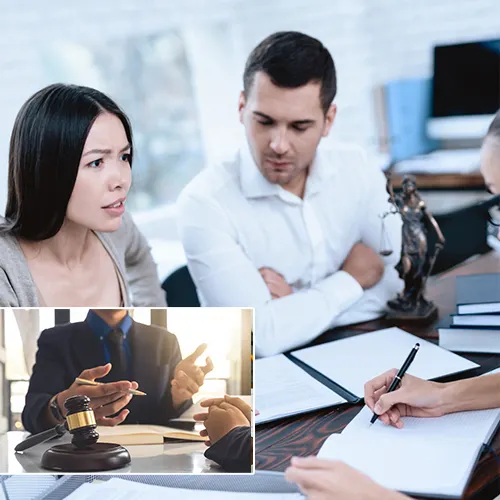Expert Tips: Recording DUI Traffic Stops Legally
Table of Contents []
Recording DUI Traffic Stops
Understanding Your Rights During DUI Traffic Stops

When you're out on the road, the flashing lights of a police vehicle pulling you over can be an anxiety-inducing experience. Being prepared and informed can make all the difference, especially in the case of a DUI traffic stop. At Frank L Leffingwell-ASSOC PC, we believe that knowledge is power, and our goal is to enlighten you on the legalities and best practices of recording your encounters with law enforcement. Such a recording can serve as a powerful tool for ensuring that both the officer and the driver adhere to legal protocols.
Many drivers are unaware of their right to record interactions during a traffic stop. You are legally allowed to record a traffic stop to create an account of what transpired; this includes DUI stops. Recording can help protect your rights and provide critically important evidence if there are any disputes about the stop or your conduct. But there's a right way to go about it, and we're here to guide you through the process properly and safely.
Your Right to Record
Across the country, you have the First Amendment right to record public officials, including police officers, in the performance of their duties. The important factor to remember is that the recording must not interfere with the officer's ability to perform their job. Our team strongly advises you to inform the officer calmly and politely that you are recording the interaction. This transparency helps set a cooperative tone and can mitigate any potential misunderstandings.
If the officer objects, it's important to know that, in most cases, they cannot lawfully prevent you from recording. However, following their instructions and not resisting physically is key to avoiding an escalation. If you have any uncertainties about your rights to record in your specific location, our legal professionals are available to clarify and assist you on this matter.
Best Practices for Recording
When recording any legal encounter, visibility and audio clarity are essential. Ensure your device has sufficient storage and battery life before you begin recording. It's advisable to use a dashboard camera or handheld device that can be easily placed in a stable position to capture the entire interaction without the need for you to hold it. This allows you to keep your hands visible, which is important for officer safety and your own.
Additionally, ensure that the recording device does not obstruct your view or the officer's ability to communicate with you. Having a clear understanding of how to operate your recording equipment before a stop occurs will make the process smoother and help keep the focus on the interaction at hand. Always be sure to save the recording immediately and back it up to a secure location.
After the Stop
Once the traffic stop is complete, there are additional steps you can take to ensure your recording is preserved and used effectively. One of the first things you should do is document everything you recall about the stop, including time, location, and the officer's name and badge number, if possible. This written account can serve as a supplementary piece of evidence and can be beneficial if there are any discrepancies between your recording and the officer's report.
If you believe your rights have been violated during the stop, or if you wish to contest any charges from the stop, it's crucial to reach out to legal professionals who are well-versed in this area of law. Our dedicated team is readily available to review your case and provide expert advice. You can easily reach out to us for questions or to book an appointment at (512) 246-3040.
Essential Guidelines for Conduct During a DUI Stop

During a DUI stop, your conduct is under close observation by the officer. It's imperative to act in a manner that is respectful, non-threatening, and compliant with lawful orders. Your mannerisms and the words you choose are as important as the footage you record, and they contribute to the narrative of the stop.
The key is to remain calm and collected, even though you might be feeling nervous. Speaking calmly, maintaining a courteous demeanor, and avoiding sudden movements can help set the tone for a civil exchange. Keep your hands visible at all times and avoid reaching for anything without the officer's permission, as these actions can potentially be misinterpreted as threatening.
Communication with Law Enforcement
Effective communication is paramount. Clearly articulating your actions, like reaching into the glove compartment for your registration, can prevent misunderstandings. If an officer asks you questions, remember that you have the right to remain silent and politely decline to answer incriminating questions without a lawyer present. However, you must identify yourself and provide your driver's license, registration, and proof of insurance when requested.
It's also important to listen attentively to the officer's questions and instructions. This ensures that you don't inadvertently misinterpret a request, which could complicate the situation. If you're unsure or don't understand an instruction, ask for clarification. It's better to be certain than to assume.
Compliance with Officer Instructions
Following the officer's instructions is crucial. Non-compliance can escalate the situation and may even lead to arrest, regardless of the reason for the original stop. If the officer requests that you step out of the vehicle, do so slowly and smoothly, keeping your hands visible. Always maintain a polite discourse, even if you disagree with the officer's approach or reasoning.
If you are subjected to a field sobriety test or a breathalyzer test, you should be aware that refusal can have legal consequences such as an automatic license suspension in some states, depending on the implied consent laws. That said, if you choose to refuse, do so respectfully and be aware of the potential outcomes.
Seeking Legal Support Post-Stop
After the conclusion of the DUI stop, if you feel your rights were compromised or if you are facing charges, it's important to seek legal support promptly. The timely analysis of the recording and other evidence by knowledgeable attorneys can significantly impact the outcome of your case.
Our team is composed of seasoned legal professionals who understand the intricacies of DUI cases and can help you navigate the legal system effectively. We advocate for your rights and offer counsel on the best course of action. Don't hesitate to contact us when you need support. Just a call away at (512) 246-3040.
Technological Solutions for Recording DUI Stops

In the digital age, technological advancements offer various options for recording interactions during DUI traffic stops. Knowing which technology to use and understanding its capabilities are pivotal in capturing clear and admissible evidence. At Frank L Leffingwell-ASSOC PC, we assist you in this selection process and offer insights into leveraging technology during these critical moments.
Various types of recording devices are available to drivers, ranging from simple smartphone apps to sophisticated dashboard cameras. Each has its benefits and limitations. Understanding these can help ensure that your recording serves its intended purpose of enhancing transparency and accountability during a DUI traffic stop.
Choosing the Right Recording Device
Selecting the appropriate recording device depends on factors such as ease of use, reliability, and the quality of the footage it captures. Smartphones are nearly ubiquitous and can be used to quickly start recording; however, they often require you to hold them, which might not be ideal during a stop.
Dashboard cameras (dash cams), on the other hand, offer a hands-free recording option that provides a constant, unobstructed view of the interaction. They can run continuously, ensuring nothing is missed from the moment the police lights come on.
Benefits of Dash Cams
Dash cams are increasingly popular due to their set-and-forget nature. Once installed, they provide a multitude of benefits:
- They automatically record when the vehicle is running, capturing video and audio without driver intervention.
- High-definition footage can clearly show the events of the stop, which can be pivotal during legal proceedings.
- Many models come with features like GPS tracking, which documents the location and speed of your vehicle, adding context to the scenario.
Dash cams can be particularly helpful not only during DUI stops but in any driving scenario where documentation is beneficial. Let us help you navigate the options and find the best fit for your needs.
Legality and Admissibility of Recordings
While recordings can be valuable, understanding their legality is equally important. Not all recordings are admissible in court due to the quality of the footage, how it was obtained, or if it infringed upon the privacy rights of the individuals involved.
Our experts at Frank L Leffingwell-ASSOC PC can review your recordings to assess their admissibility and advise you accordingly. Remember, recordings that adhere to the law not only can hold up in court but also uphold the integrity of the legal process. For personalized advice, reach out to our proficient team at (512) 246-3040 today.
Taking Action: Leveraging Recordings in Your Defense

If you've recorded your DUI traffic stop, taking the correct steps afterward is critical in leveraging the footage to your advantage. Whether you wish to file a complaint, defend yourself against charges, or simply hold parties accountable, the recording can be pivotal. We at Frank L Leffingwell-ASSOC PC are here to assist you in making the most of your recordings as part of your defense strategy.
It's important to understand that simply having a recording isn't enough; you need to know how to use it effectively. This involves proper storage, maintaining the chain of custody, and having legal professionals who can present the evidence compellingly in court. Failure to handle the recording correctly could lead to it being dismissed as evidence or, worse, used against you.
Proper Storage and Backup of Recordings
After recording an encounter, the first step is to ensure the footage is safe. Back up the recording to a secure location as soon as possible. This might mean uploading it to cloud storage or transferring it to an external hard drive. The goal is to prevent any loss or corruption of the data that could compromise its integrity as evidence.
Having multiple backups is good practice and can serve as an insurance policy in case one version becomes inaccessible. It's also wise to avoid sharing the recording on social media or with anyone outside of your legal counsel to prevent any claims of tampering or prejudice.
Chain of Custody and Legal Representation
A clear chain of custody for the recording must be established to use it in a legal setting. This means documenting who has handled the recording, how it has been stored, and that it has not been altered from its original state. Skilled legal counsel, like the kind we offer, is crucial in establishing this chain of custody and presenting the recording effectively.
Our attorneys understand the nuances of DUI laws and how to frame your recording in the context of your case. With careful analysis and strategic planning, the right legal team can use your recording to challenge the prosecutor's narrative and strengthen your defense.
Taking the Next Step
If you are facing DUI charges or have concerns about a recent traffic stop, take action immediately. The sooner you get in contact with a legal professional, the better your chances of utilizing your recording effectively.
At Frank L Leffingwell-ASSOC PC, our dedicated team is here to guide you every step of the way. We can review the evidence, advise on your rights, and work tirelessly to ensure your voice is heard. Let us help you turn your recording into a compelling element of your defense. Dial (512) 246-3040 and take the first step towards a seasoned defense with our team.
Connect with Frank L Leffingwell-ASSOC PC for Expert DUI Stop Advice

If you have questions about recording DUI traffic stops or if you've recently been involved in a DUI stop and need assistance, we are here to help. At Frank L Leffingwell-ASSOC PC, we stand ready to educate and support individuals across the nation in their pursuit of justice and fair treatment.
Our commitment to your rights is unwavering, and we are passionate about leveraging all available resources to protect your legal interests. To access our expertise or to book an appointment, you need only give us a call. Our knowledgeable team is always available to answer your questions, discuss the details of your case, or simply provide peace of mind. Reach out to us at (512) 246-3040.
[CALL TO ACTION]
Don't navigate the complexities of DUI traffic stops on your own. Tap into the experience and understanding of our legal professionals at Frank L Leffingwell-ASSOC PC. With our support and advisement, you can ensure that your rights are protected, and your recordings are put to their best use. Remember, you're not alone. Take action and contact us today at (512) 246-3040 for peace of mind and robust legal defense.

